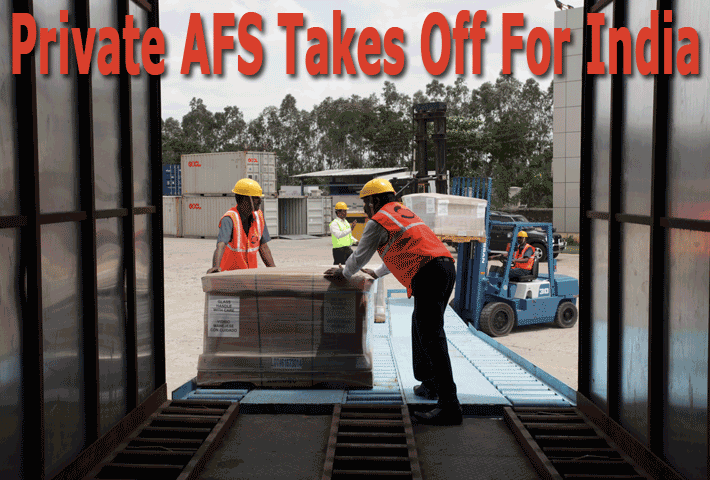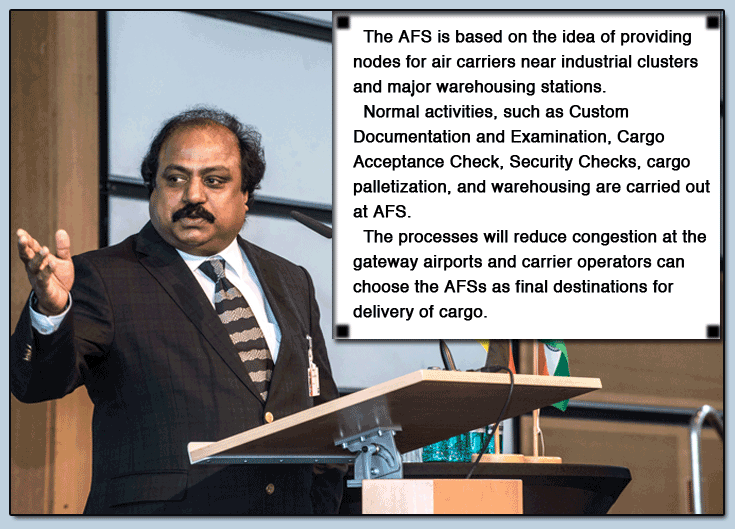
A
long time in the making, India’s first privately controlled
and operated Air Freight Station (AFS) kicked off in Chennai
last month.
Industry stakeholders might
remember that bids to start AFSs earlier in Chennai failed
for a variety of reasons.
The AFS concept was floated
in 2006 when a spurt was seen in the air cargo traffic in
Chennai.
The airport’s cargo complex
was congested and the only way to clear the clutter was to
have an AFS in close proximity of the airport, where pillarization,
Customs, and other facilities could be completed.
Years
In The Making
Later, efforts by the government-controlled
Central Warehousing Corporation were made, but could not take
off.
This time around, however, with
the Ministry of Civil Aviation backing the creation of AFSs,
the first one—spread out over 20,000 sq. ft.—has
started operations. In fact, the Indev-controlled unit got
its operating license from the Customs Department three years
ago but was delayed because of the lack of EDI (Electronic
Data Interchange) connectivity.
An enthusiastic Xavier Britto,
chairman, Indev AFS, pointed out soon after the station opened
its doors that the station “ handled 5-10 percent of
the cargo of Chennai airport.”
“Now, the ULDs can be
moved directly from aircraft to bonded trucks and “to
our facility where all operations similar to what is available
at the airport will be provided,” Britto said.
“Customs officers are
present on-site round the clock to do the entire formalities,
including the online filing, assessment, inspection, and delivery,”
Britto added.
Time
Saving Charges
“The AFS,” said
Britto, “is reducing the lead time significantly from
the present airport clearance period, which is five days.
“In addition, the airport
levied demurrage charges after 72 hours.
“At the AFS we want to
give a second day delivery and demurrage charges will be collected
only after five days,” he said. Indev’s charges
will be 15-20 percent less than what is being paid by stakeholders
at the airport.
 |
Looking
for Partners
Indev has started talks and
has signed contracts with a number of international carriers
like Lufthansa and Singapore Airlines, Mr. Britto indicated.
Perhaps what is of prime importance
to the ex-im trade is that the AFS license allows it to consolidate
import cargo not only to Chennai, but also to other airports
in the south like Bengaluru, Hyderabad, Kochi, and Coimbatore.
Incidentally, Chennai apparently
has the capacity to handle half a million tons but did a business
of only 0.22 million tons last year.
That airport lost out a lot
of cargo because of congestion and inefficient handling methods.
“Some of the clients have
gone to Hyderabad, most of them have gone to Bengaluru,”
said Britto.
“The AFS will help to
stem that drain as we deliver the technology.
“Our Web Management System
(WMS) enables customers to find out how their shipments are
being handled from their offices in real time.
“Through the web you can
monitor your cargo movement, de-stuffing, handling, and delivery,”
Britto pointed out.
Imports
At Start Up
For the first few months, however,
Indev AFS will only handle imports. Import shipments will
be transported by road to the AFS from the airport, where
Customs will issue the clearance.
The facility will be handling
automobile, electronics, electrical, and textile industry
components.
Why
Will AFS Work?
Talking about the AFS concept,
Britto, a former professor of the city’s prestigious
Loyola College, said that “in India around 2.2 million
tons of cargo per annum is handled through airports and the
existing infrastructure at airports continues to be inadequate
to deal with the growing volume of cargo.
“This leads to high dwell
time and high transaction costs for imports and exports.
“In order to meet the
requirements of the industry, the government has been constantly
evolving various facilitation measures, and measures have
been taken for the creation of adequate mechanization, automation,
and reliable infrastructure.
“To facilitate faster
clearance and delivery of goods in a swift manner, the government
notified dry ports in the hinterland as Customs Stations.
“The AFS is based on the
idea of providing nodes for air carriers near industrial clusters
and major warehousing stations.
“Normal activities, such
as Custom Documentation and Examination, Cargo Acceptance
Check, Security Checks, cargo palletization, and warehousing
are carried out at AFS.
“The processes will reduce
congestion at the gateway airports and carrier operators can
choose the AFSs as final destinations for delivery of cargo,”
Mr. Britto said.
Back in 1999, Britto pointed
out that the government of India issued Circular No. 69/1999
(dated 06.10.1999) for movement of import cargo by containers/trucks
from Airports/ACC to ICDs/CFS/Airports/Air Cargo Complexes
(ACCs).
Though the circular was issued
16 years ago, due to various reasons, the facility of transshipment
from gateway airports to AFSs has remained a non-starter.
“After constant persuasion
and various representations, the government has developed
a software model for transshipment of cargo from Air Cargo
Complexes to Air Freight Stations and Air Cargo Complexes
(ACCs) in other Customs Station under the existing EDI system”
Mr. Britto said.
“This facility will be
used by various stakeholders shortly and will ensure complete
accountability under the existing EDI system.”
Adding
Infrastructure
For its part, the Airports Authority
of India will be creating an additional bay in Chennai for
wide-body aircraft as well as a new cargo bay.
The two will be ready within
a year and freighters that were going away to Bengaluru would,
AAI officials hoped, start landing in Chennai.
The growth trends are showing:
the airport, for example, handled exports of 24,300 tons of
textiles and garments and imported around 20,900 tons of engineering
goods in 2014-15.
Between January and June 2015,
Chennai airport saw 110,691 mt (international) and 41,488
mt (domestic) of cargo (in the same period in 2014, the airport
handled 109,543 mt of international and 36,585 mt of domestic
cargo).
AAI told FlyingTypers that it also has plans for a common user cargo terminal and
an additional bay for Boeing 747s in the second phase of the
airport expansion.
Tirthankar Ghosh



